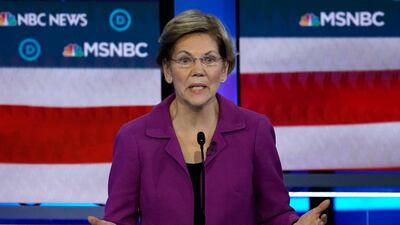Pete Buttigieg is ending his run to be the Democratic presidential candidate in the 2020 US election just hours before Super Tuesday test for the party's White House hopefuls.
On Tuesday, 14 states go to the polls in party primaries, doling out 40 per cent of the delegates required to win the nomination. It is seen as the first major nation-wide test of a candidate's appeal as all the votes up to now have been held in single states at a time.
“Tonight I am making the difficult decision to suspend my campaign for the presidency," he told a crowd of supporters in his hometown of South Bend. "I will do everything in my power to ensure we that have a new Democratic president come January.”
The path for the young, former mayor of a small Indiana city became increasingly narrow after disappointing finishes in the Nevada caucuses and South Carolina primary.
Despite gaining more delegates than front-runner Bernie Sanders in Iowa, Mr Buttigieg, 38, failed to impress voters of colour.
On the campaign trail, he presented himself as a representative of a younger generation ready to take over from politicians in their seventies, such as Mr Sanders, 78, and Joe Biden, 77.
Mr Buttigieg also promoted his service as a Navy intelligence officer, including his tour of Afghanistan, which he said gave him credibility on national security.
He won the Iowa caucuses and placed second in New Hampshire but had trouble in the next two states, where there is a larger proportion of non-white voters.
Mr Buttigieg came third in Nevada. And he came in fourth in South Carolina, with just 2 per cent support from African Americans, who are a majority of the state’s Democratic voters.
He failed to build a diverse base of support because he was known for firing the African-American police and fire chiefs in South Bend, Indiana, where he was mayor.
Mr Buttigieg’s biography made him something of a wunderkind among the Democratic contenders. He graduated from Harvard University and was then a Rhodes Scholar.
He was the youngest mayor of a city with a population of more than 100,000 when he was elected at the age of 29.
Mr Buttigieg was also the first openly gay presidential candidate to win delegates towards the nomination.
He came out as gay while running for re-election for mayor, which he won handily, and his husband Chasten joined him on the presidential campaign trail.
The candidate’s cerebral approach to issues drew an enthusiastic response with some audiences but failed to connect with the wider Democratic electorate.
Mr Buttigieg was able to fundraise large amounts, bringing in the second-biggest haul of any candidate in 2019 behind Mr Sanders, but by the end of his campaign was bleeding cash.
For the whole of last year, he brought on $76.2 million.
But his lack of experience beyond the local level drew scrutiny from other candidates.
Mr Buttigieg had lost his bid for state treasurer of Indiana in 2010 and in 2017 withdrew his bid for chair of the Democratic National Committee on the day of the election.
Financial backers of Senator Cory Booker, who pulled out of the race on January 13, poked fun of his and Mr Buttigieg's similar histories in an advertisement.
Mr Booker was also a Rhodes Scholar and served as mayor of Newark, New Jersey, a city with more than twice the population of South Bend, before becoming a US senator.
“He’s a Rhodes Scholar. A successful mayor. A uniter,” the ad began before flashing to an image of Mr Buttigieg. “No, not that guy. It’s Cory Booker.”
Mr Buttigieg played up his youth as an asset.
“I bring a different perspective,” he said in a January debate in Des Moines, Iowa.
“There are enlisted people that I served with, barely old enough to remember those votes on the authorisation after 9/11, on the war in Iraq.
"There are people now old enough to enlist who were not alive during those debates.”
Mr Buttigieg fired South Bend’s first black police chief, who had been recording phone calls of other officers allegedly making racist remarks in 2012.
The officer later sued for discrimination. The racial tension in South Bend intensified in June 2019 when an officer shot and killed a black man. Mr Buttigieg briefly left the campaign trail to return to South Bend to address the crisis.
As the campaign went on, he also received criticism for pivoting mid-race from a progressive to a moderate, younger alternative to former vice president Mr Biden.
He expressed support for Medicare for All but then campaigned for “Medicare for all Who Want it,” which would allow for private insurance and public options.
Nationally, Mr Buttigieg averaged 5 to 8 per cent in the RealClearPolitics average, peaking at 11.8 per cent in late November.
Now, the former mayor and former presidential candidate has not set out his future course in or out of politics.
Mr Buttigieg gained traction after a CNN Town Hall in March where he criticised conservative evangelical Vice President Mike Pence’s fundamentalist interpretation of Christianity.
Mr Pence served as governor of Indiana while he was mayor of South Bend.
“His interpretation of scripture is pretty different than mine to begin with,” Mr Buttigieg said in March.
“My understanding of scripture is that it’s about protecting the stranger and the prisoner and the poor person, and that idea.
"That’s what I get in the gospel when I’m at church and his has a lot more to do with sexuality.”














